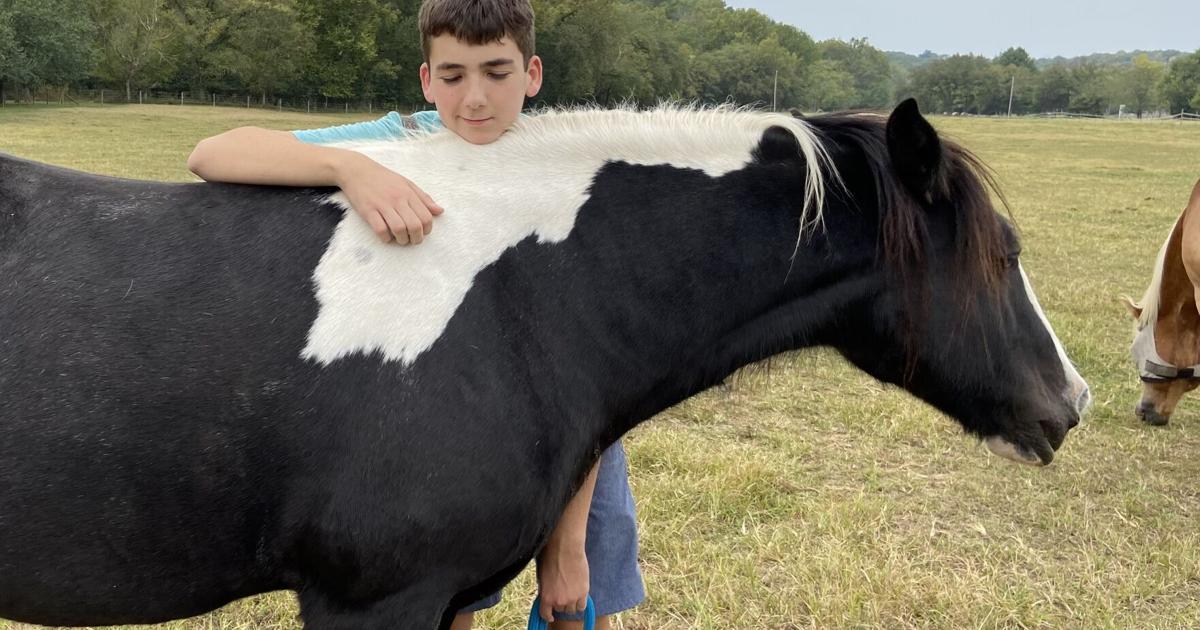
Photo courtesy of Equine-Assisted Therapy, Inc.
Equine-Assisted Therapy, Inc. practices a less-common alternative therapy in which horses help patients get better after injury or illness and is becoming increasingly popular among people seeking treatment outside of a clinical setting, said Lulu Bogolin, the nonprofit’s executive director.
“Horses are prey animals and they live in what’s called survival mode, or fight or flight mode,” Bogolin explains. “When we think about our clients – participants who are dealing with trauma, lifelong challenges or disabilities, or stroke recovery – they also live in what’s called survival mode. [The horses and participants] They are able to understand each other in a way that those of us who aren’t facing the same challenges can’t. They understand where each other is at and really help each other persevere and take the next step.”
Noah Jacob
“I owe all of this success to the amazing people and horses at Equine-Assisted Therapy. Not only to the horses, but to the amazing people who helped me overcome the fears that were holding me back.”
– Noah Jacob
Anyone else reading this…

Photo courtesy of Equine-Assisted Therapy, Inc.
Both the main facility in Wildwood and the satellite facility in Town and Country are dedicated to the nonprofit’s mission of “providing equestrian activities to individuals with mental, physical and psychological challenges and disabilities to enhance their quality and productivity of life.”Equine-Assisted Therapy, Inc. serves approximately 150 equestrians weekly with four full-time paid staff, 16 certified equestrian therapy instructors, one licensed professional counselor, one physical and occupational therapist, one speech-language pathologist and approximately 250 volunteers each week.

Photo of Noah Jacob courtesy of Equine-Assisted Therapy, Inc.
To ensure the safety of horses and riders, each therapy session requires a team of trained volunteers, consisting of an equine leader and two “sidewalkers” who walk beside the horse and interact with the rider. Paid instructors are certified by at least one of four organizations: Professional Association of Therapeutic Horsemanship International, Spirit Horse International, Eagala and Equine Connection.
Bogolin said the organization has grown significantly since it was founded in 2004, and hopes to continue to grow and reduce its waiting list, which currently stands at about 60 people. But providing quality care to more people and animals requires significant funding and continued volunteer support. The nonprofit’s largest fundraiser, Hoedown for Hope, is scheduled for Sept. 28 and will support the scholarship fund in addition to general operations. “Our scholarship program means we can’t turn anyone away for financial reasons,” Bogolin said.
Bogolin says a unique opportunity to help the organization may be on the horizon: Town & Country’s arena is seasonal because, like Wildwood’s, it doesn’t have a roof, but a generous donor could contribute to renovations and win naming rights to the new arena. Such a project could increase the number of riders who benefit from equine therapy programs year-round, and, as their slogan goes, “change lives, one hoofprint at a time.”
Equine-Assisted Therapy, Inc., 3369 Highway 109, Wildwood, Longview Farm Park, 13525 Clayton Road, Town and Country, 314-971-0605, eatherapy.org
Volunteer Spotlight: Noah Jacob
Noah Jacob began participating in horse-assisted therapy as a volunteer, but after learning about the program and seeing the impact it had on riders, he realized he too could benefit from equine-assisted psychotherapy.
Jacob, a third-year student at the University of Medicine and Life Sciences in St. Louis, was still a student when a teacher and classmate were killed in a mass shooting at neighboring Central Visual and Performing Arts High School in 2022. “That day in October, I witnessed scenes I would prefer to forget,” Jacob said in a statement.
To cope with his PTSD and panic attacks, Jacob began therapy sessions with a horse named Bennett. “Like me, Bennett had a traumatic past,” Jacob recalls. “In our first session, I felt calm with Bennett and I felt the same way with him.”
Their connection was undeniable: “As I recounted my experiences and trauma, Bennett would walk away. He became a physical symbol of my emotions. He told me how I was feeling, what memories really caused me pain.”
Although going back to school has been hard, his time with Bennett has brought Jacob some peace. He continues to volunteer at nonprofits and spend time with Bennett, who he calls his “best friend through the toughest times.” [his] life. “
“I’m interacting more with my friends, I’m more interested in my classes, and most importantly, I feel safe again,” Jacob says of the effects of the therapy. “I owe all of this success to the amazing people and horses at Equine Assisted Therapy. Not only to the horses, but to the amazing people who helped me overcome the fears that were holding me back.”
Photo courtesy of Equine-Assisted Therapy, Inc.
Be the first to know
Get local news delivered to your inbox!

